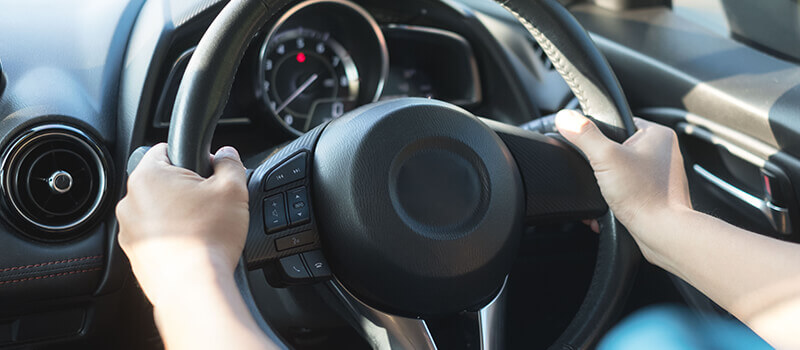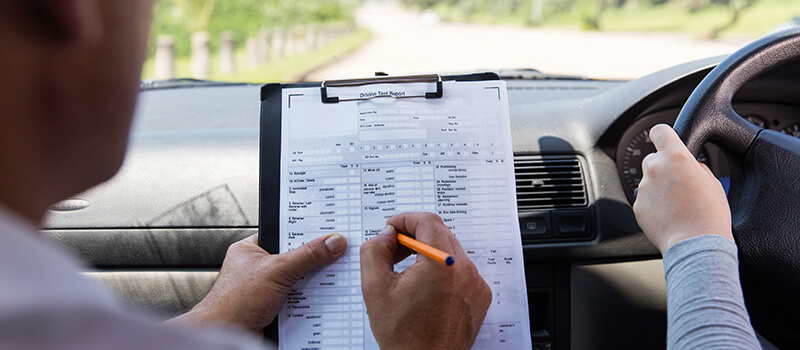It's expected that you will feel some nerves before your driving test, the same as you would if you were taking a big exam at school or going for a job interview. Whether you're learning to drive in London, Milton Keynes, Leighton Buzzard, or one of our many other locations, your driving instructor will be preparing you for your test from your very first driving lesson, so you should feel confident and ready. We're here to provide as much information as possible so that everything runs as smoothly as possible. Here we shed some light on how to calm nerves before your driving test.
Our tips for driving test nerves
At DRIVE 321, we want all of our pupils to go into their driving tests feeling as ready as possible, so they perform at their best and pass. During your time learning to drive with us, your instructor will have been showing you the test routes and carrying out regular mock tests to help get you ready. Another way you can prepare yourself is by following our tips for driving test nerves.
Before your driving test
In the lead up to your driving test, there are some steps you can take to mentally and physically prepare yourself for your driving test and to try and keep the nerves to a minimum. Being organised and having what you need for your driving test is one way you can prepare yourself.
Believe in yourself and be confident
Believing in yourself and feeling confident about your upcoming test is so important when it comes to dealing with driving test nerves. As the old saying goes "whether you think you can, or you think you can't – you're right". Tell yourself that you're a safe and capable driver and that you're going to pass, have confidence in yourself and have a positive mental attitude.

Practice makes perfect
The more practice you can get in before your test, the better. In the weeks leading up to your test, we would highly recommend that you increase your weekly lesson time. You can use this time to work on any of your weaker areas, go over the test routes and become a master of your manoeuvres. The better you prepare for your driving test, the less nervous you will feel for your test.
Rescue remedy for your driving test
Herbal remedies such as rescue remedy are very popular among pupils taking their driving tests. Rescue remedy is said to provide calm, increase focus and relieve stress and anxiety; you can see why so many learners turn to it for their test.
If you are considering using any herbal remedies such as rescue remedy for your driving test, always read the label carefully before taking it. It would help if you began using rescue remedy during your driving lessons a couple of weeks before your test so you can see how your body reacts and make sure they are suitable for you.
During the test
Try not to let nerves get the better of you during your driving test. Nerves can make you panic and make silly mistakes. Here are some ways you can try to control nerves during your driving test.

Don't dwell on mistakes
If you do make a mistake during the test, don't dwell on it and allow it to affect the rest of your drive. Chances are, if you focus on a mistake you've already made, you will end up making more mistakes. You can't change a mistake you've already made, but you can decide how you want the rest of your drive to go. Many mistakes made during the driving test will be marked as minor faults, so although you may think it's all over and you've failed because you stalled the car, the examiner may have just marked it as a minor.
Time your approaches well
During your driving test, try to read the road and time your approaches accordingly. Correctly timing your approaches will reduce the number of times you have to stop and will also reduce the likelihood of hesitating when at a junction or roundabout. If you time your approaches correctly, your examiner will be impressed that you can read the road well.
Don't worry if you see the examiner taking notes
Your examiner will be taking notes and writing on the marking sheet during your test; it's nothing to worry about. They will be marking every part of your test, from whether you check your mirrors and use signals correctly, to how you approach junctions. Some examiners will record things as, and when they happen, others will wait until a few minutes after and a few will wait right until the very end of the test. Don't try and see what the examiner is putting on the marking sheet, this won't go down well, and your eyes should be on the road!

Take it slow
Take your time and think carefully about what you're doing at every stage during your test. You may feel a bit panicked, which can make you rush things and make mistakes. Take a deep breath and take your time; there's no points for completing a manoeuvre in record time. It's better that you take a few extra minutes and get it right than to try and do it quickly and mess it up.
After the driving test
At the end of your driving test, your examiner will tell you whether you've passed or failed. If you've passed, hooray well done! If you've unfortunately failed, you will understandably be disappointed. Listen carefully to the feedback you receive from your examiner and use it to improve and hopefully pass next time!
You will be fine
Your instructor would not let you take your test if they didn't think you were 100% ready, so hold onto this knowledge and be confident. Listen to your driving instructors advice, follow our tips, and you will give yourself the best possible chance of passing. Whether you pass first, the second or third time, it doesn't matter! If you're wondering how to pass your driving test first time, we've put together a guide of everything you need to know to increase your chances.